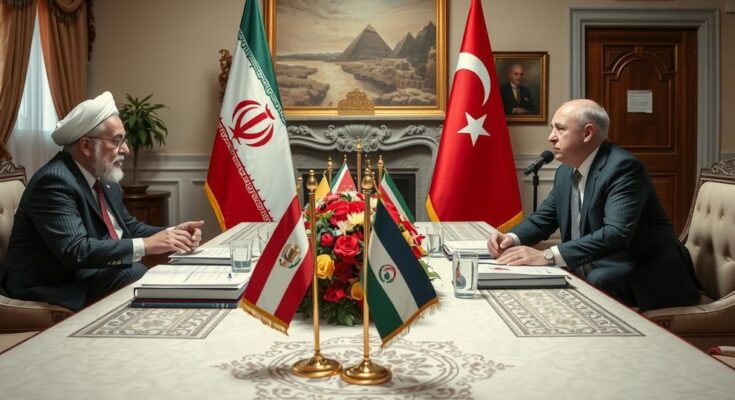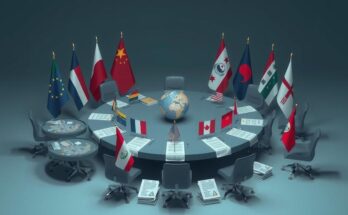Egypt hosted a summit with Turkey and Iran’s presidents, amidst regional turmoil, marking a shift in Middle Eastern power dynamics. The summit addresses the weakened status of Iranian proxies like Hamas and Hezbollah, and highlights Egypt’s concerns about Houthi attacks on shipping. This meeting symbolizes the evolving relations between Egypt, Turkey, and Iran, focusing on cooperation despite historical tensions.
On Thursday, Egypt hosted a significant summit involving Turkey’s President Recep Tayyip Erdogan and Iran’s President Masoud Pezeshkian, among leaders of eight Muslim-majority nations known as the Developing-8. This event took place in Egypt’s New Administrative Capital amid ongoing instability in the Middle East. The summit underscores the evolving dynamics within the region as non-Arab countries, particularly Turkey and Iran, increase their influence on local affairs, overshadowing traditional Arab leadership.
The backdrop of this summit reveals the recent challenges faced by Iranian-aligned groups, notably Hamas, which has suffered losses in Gaza after an extended conflict with Israel. Similarly, Hezbollah, Iran’s principal militia, has been significantly impacted. The recent removal of Syrian President Bashar al-Assad’s regime, which had relied on Iranian and Russian support, further illustrates this shift in power dynamics. Anis Salem, a former diplomat noted, “The weight and influence of the Arab Middle East is waning and the centres of power in the region are shifting to non-Arab players like Turkey, Iran and Israel.”
This summit marks Mr. Pezeshkian’s first visit to Egypt as president—an important diplomatic event considering the historical tensions between the two nations since the 1979 Islamic Revolution. The discussions are likely to address regional conflicts, including the Houthi attacks on Red Sea shipping, which have strained Egypt’s economy. Egyptian President Abdel Fattah El Sisi hopes to engage Mr. Pezeshkian on the urgent issue of Houthi aggression in support of the Palestinian cause, which has severely threatened revenues from the Suez Canal.
The summit will also focus on broader geopolitical issues, including the Israeli-Palestinian conflict and Hezbollah’s weakening status in Lebanon. Egypt aims to encourage Iran to exert influence over Houthis to cease their maritime attacks, further emphasizing Egypt’s regional security concerns. Despite these diplomatic overtures, tensions remain high, and Egypt insists on Iran’s non-interference in Arab affairs. On a cooperative front, Egypt and Turkey have normalized relations after years of conflict over support for opposing factions in Libya and differing stances regarding the 2013 ousting of Mohamed Morsi. The D-8 summit aims to bolster cooperation amongst its members, including nations like Nigeria, Pakistan, and Indonesia, focusing on shared economic interests and regional stability.
The Developing-8 (D-8) is an organization of eight Muslim-majority nations founded in 1997 with the intent of fostering cooperation among its members. Recent geopolitical tensions in the Middle East have highlighted a shift in regional power dynamics, with Turkey and Iran emerging as influential non-Arab players. The backdrop of this summit includes significant military losses for Iranian proxies in conflicts across the region, raising questions regarding Iran’s continued involvement in local affairs, particularly in Lebanon and Yemen. Additionally, relations between Egypt and Iran, once strained, have seen a cautious thaw as both nations navigate a complex landscape of alliances and conflicts.
In conclusion, the summit held in Egypt signifies a pivotal moment for regional diplomacy, as Turkey and Iran navigate their shared agendas amidst turmoil in the Middle East. The meeting not only underscores the diminishing influence of traditional Arab leadership, but also reflects the urgent need for collaboration on pressing issues such as security in the Red Sea and the ongoing conflicts in Gaza and Lebanon. As Egypt seeks to balance its relationships with both Turkey and Iran, the outcomes of this summit will be crucial for the future stability of the region.
Original Source: www.thenationalnews.com




